
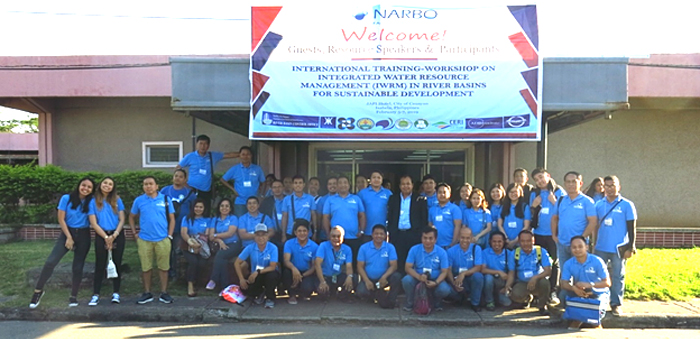
NARBO held the international Training-Workshop for three days from 5 February to 7 February, 2019 in Cauayan City, Isabela, the Philippines, focusing on "Mainstreaming Climate Change Adaptation and Disaster Risk Management in Integrated Water Resources Management of River Basins in Monsoon Asia" with the cooperation from various organizations, including Isabela State University, a knowledge partner of NARBO.
The Workshop and on-site tours were held in addition to the lectures given by invited various experienced lecturers in the water sector from various institutions, including international organizations, research organizations, government bodies, and university, etc.
The objectives of this event are shown below.
- Explore the state of water insecurity in each river basin and identify supply/demand gaps;
- Promotion of rural development and food security through strengthened River Basin Organizations;
- Provide platform for knowledge sharing on principles and implementation practices of sustainable IWRM on monsoon river basins in Asia;
- Introduce IWRM analytical tools for performance assessment, decision support and governance; and
- Develop action plans for sustainable river basin management.
For this event, there were about 100 participants, representing various fields, including the river basin organizations, public offices, and universities, etc.
Day 1 (5 February) Lectures
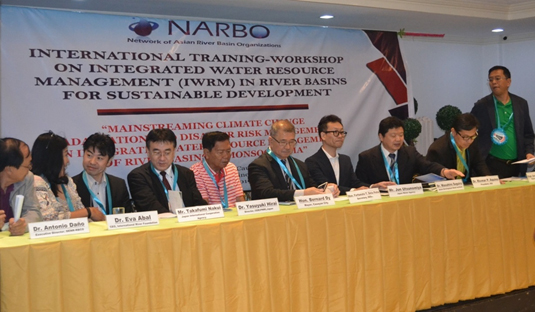
Opening Program
On the first day, the program started with the opening remarks by city administrator of Cauayan City Mr. Jose Abad, and the president of Isabela State University Dr. Ricmar Aquino.
Following the remarks, Minister Fortunato T. De La Pena of the Department of Science and Technology delivered the keynote speech, in which he elaborated on the water-related subject among the Sustainable Development Goals (SDGs), which was the UN development goals, then introduced the programs such as the project on non-destructive testing of dam's concrete, the NWRB (=National Water Resources Board) project to introduce real time monitoring system on water.
After the opening program, lectures were given, first by Dr. Antonio M. Daño, DENR (=Department of Environment and Natural Resources), having jurisdiction over major river basin management in the Philippines. He introduced the implementation cases of IWRM for the water security and rural development in the Philippines. Then, Atty Gill Aromin, Regional Director of Region 2 of DENR introduced the application status of IWRM in Cagayan River Basin, which was the largest river basin in the Philippines. Then, the NARBO Secretariat explained the outline of NARBO, implementation cases of IWRM in Japan, and practical disaster management against floods and earthquakes being performed by the Japan Water Agency.
In addition, representatives of the participants introduced the status quo of the river basin management conducted by respective river basin organizations for the RBO reports.
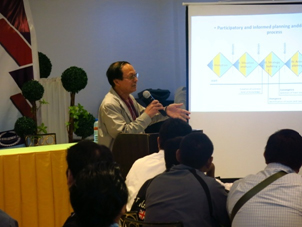
Dr. Antonio M. Daño
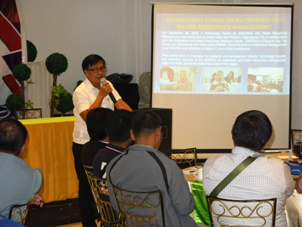
Atty. Gill Aromin
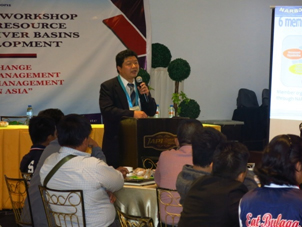
Dr. Masahiro Sugiura
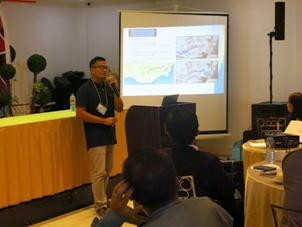
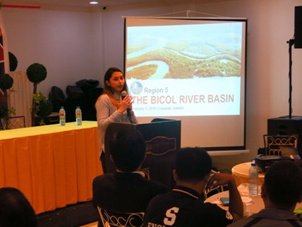
Day 2 (6 February) Lectures and the Site Visit
On the second day, the participants to the event paid the visit to project sites of Magat River Integrated Irrigation System (MARIIS) such as Magat Dam, a diversion dam, a hydropower plant facility, and canal facilities, etc., all of which were managed by National Irrigation Administration (NIA).
After the site visits, they moved to NIA-DRD Office. In this office, Engr. Eduardo Ramos, Manager, Dam & Reservoir Division of MARIIS briefed on the MARIIS project and explained the management status of Magat Dam. As regards the dam management, NARBO secretariat introduced the monitoring and inspection method for dam safety management performed in Japan.
Dr. Yasuyuki Hirai, Director, Civil Engineering Research Institute for Cold Region, Japan introduced the transition of land use along Ishikari River, Hokkaido, Japan and its flood control measures, then introduced the advanced flood prediction system, including iRIC Software, etc. to respond to the climate change. Following him, Dr. Orlando F. Balderama of Isabela State University, presented the analytical tools such as SWAT, WEAP, and DSSAT models on IWRM as well as the outline of FDSS (Farmers Decision Support System) and its effectiveness. All of them are very important tools to provide various types of information necessary for implementing IWRM. In this regard, all the presentations given in this event resulted in a great opportunity in learning such valuable tools.
In addition to them, Mr. Takafumi Nakui, JICA Expert dispatched to Department of Public Works and Highways (DPWH), made the presentation of Japanese government policies against large-scale disasters, including floods, structural measures to strengthen the infrastructure facilities as part of the disaster control measures, and non-structural measures such as preparing hazard maps, timelines and early-warning system, etc.
Following those lectures, spirited discussions were made with a lot of questions from the participants of the event.
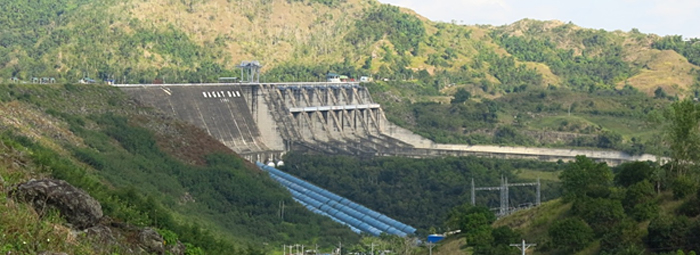
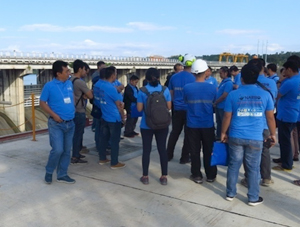
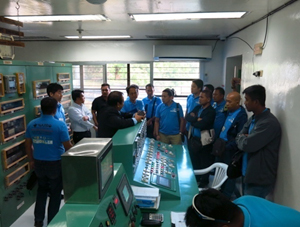
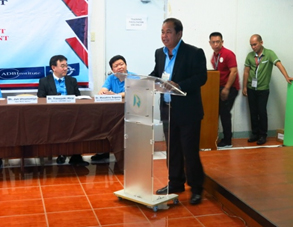
Engr. Eduardo Ramos
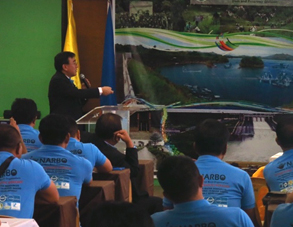
Dr. Yasuyuki Hirai
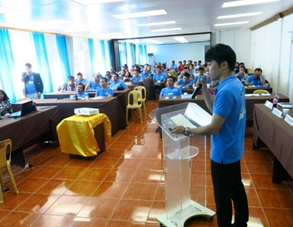
Mr. Takafumi Nakui
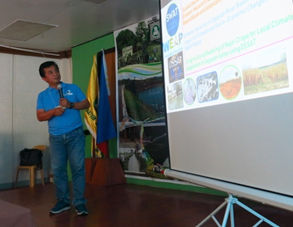
Dr. Orlando F. Balderama
Day 3 (7 February) Lectures and the Workshop
On the third day, Dr. Eva G. Abal, CEO, International River Foundation, Australia, gave the lecture entitled The Journey towards Resilient Rivers, highlighting the South East Queensland river basin management with the introduction of the framework establishment, including its tools, related projects towards Resilient Rivers.
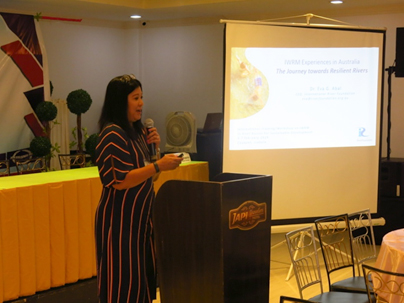
A lecture given by Dr. Eva G. Abal
The lecture was followed by the workshop session with the attendance of all the participants. In this workshop, with the use of SWOT analysis method, which is the support tool for planning an organizational strategic planning, action plans to resolve the current issues respective river basin organizations had faced were established. Beforehand, the secretariat briefed the exercise procedures and then the participants were divided in four groups before the exercise started.
As the result of the workshop, each group made a brief explanation of its achievement at the final presentation session. Each group listed up the four factors, "Strengths", "Weaknesses", "Opportunities", and "Threats", then analyzed those factors and studied the measures to be taken in the future, and finally organized respective action plans.
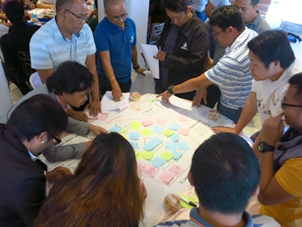
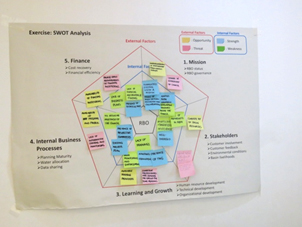
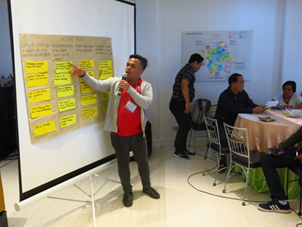
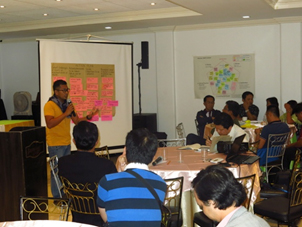
Through this event, we believe that we gained the deep understanding of the basic principles on IWRM, various requirements for implementing IWRM in respective river basins, measures in response to various issues such as disasters, and furthermore, various tools for analysis, decision-making, and governance.
In addition, thanks to the attendance of many organizations such as NARBO members and many other organizations involved in river basin management during the event, we believe that new and firm ties among all of the participants have been formed and new relations have been established.
NARBO would like to continue to provide wide varieties of information on IWRM, as well as opportunities for the close interactions among members to all member organizations.
Finally, we would like to express our sincere gratitude to many organizations in the Philippines, especially Isabela State University, for their full assistance and cooperation from the preparation stage to the final stage of management of the three-day training/workshop session.

